Sundance 2024 Best Movies: Will & Harper, A Real Pain, A Different Man


For all the challenges the world of independent film now faces (the rise of streaming, the still-stubborn comeback of theatrical, the ongoing ocean of content that can swallow up…anything), the measure of the Sundance Film Festival begins with a simple and enduring metric: How good were the movies? At Sundance 2024, the festival’s 40th year, there was a prevailing feeling that this was the strongest lineup in quite a while. The festival was peppered with films that popped, that mattered, and that looked like they could have a vibrant life beyond Sundance — which, let’s not forget, is really the whole point. Here are the 16 Sundance films that Variety’s critics fell for.
More from Variety
The American Society of Magical Negroes
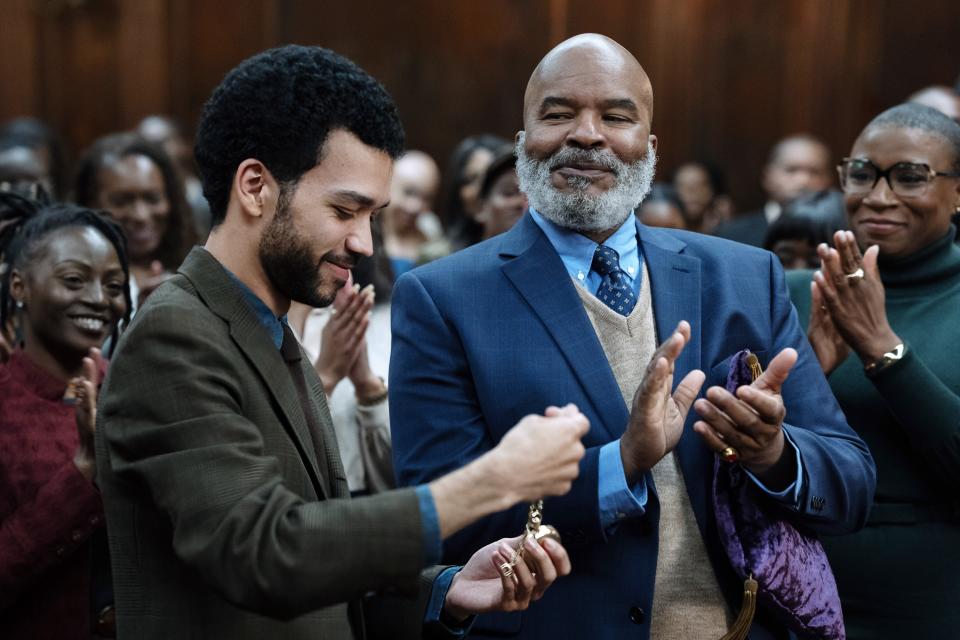
Kobi Libii’s comedy of racial images is as witty and scandalous as “American Fiction,” only this one follows through on the outrage. Aren (Justice Smith), a socially awkward aspiring sculptor, gets drafted into the American Society of Magical Negroes, a hidden organization of Black people who make themselves into the saintly supporters and homily-spouting life coaches of white people. The movie has a puckishly amusing time pretending that this is a good idea. It’s a wicked satire of white culture that’s also an empathetic satire of Black culture. It sees the deep symbiosis of our racially messed-up society. (Read the full review by Owen Gleiberman.)
Between the Temples
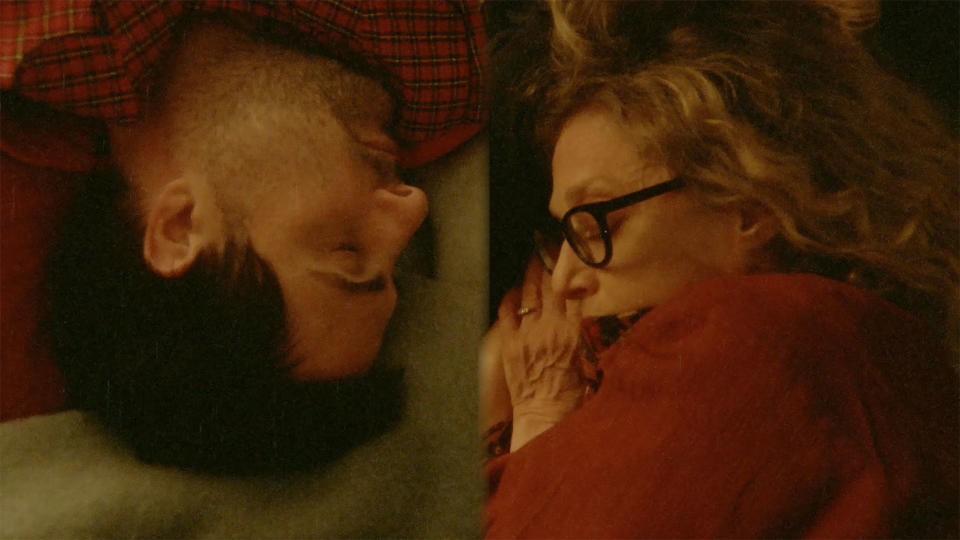
Collapsing divides between old age, middle age and adolescence into a universally relatable paean to doing whatever the hell feels right for you in your own weird situation, Nathan Silver’s scruffy shoestring indie gives a cheerfully flippant middle finger to those who object to people dating, or merely socializing, outside their immediate age group. Silver’s warm sense of care for easily-mocked characters is complemented by a successful foray into star casting: While both are playing effectively to type — nebbishy and kooky, respectively — Jason Schwartzman and Carol Kane bring humanizing notes of mania and melancholy to their established comic personae. Aptly for a film about the liberating joys of unlikely, unexpected personal connection, “Between the Temples” runs on the palpable chemistry between two eccentric character players enjoying a shared leading spotlight. (Read the full review by Guy Lodge.)
Black Box Diaries
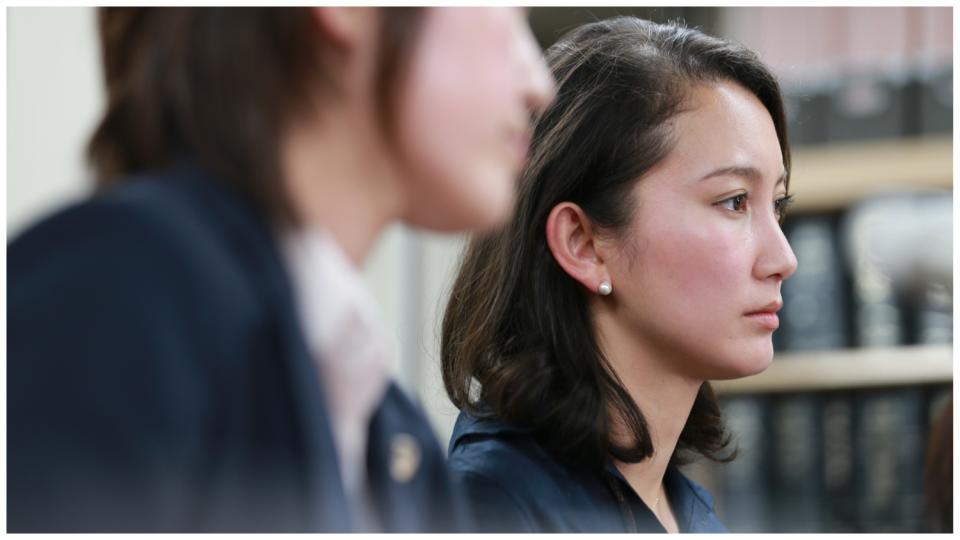
Amid the surfeit of films about women’s rights and men’s abuses of power that have emerged in the wake of the #MeToo reckoning, we haven’t yet seen one quite like this tightly wound, heart-on-sleeve procedural documentary. Shiori Ito‘s directorial debut identifies a world of systemic iniquities through the prism of a single, long labored-over case of sexual assault — crucially, the director’s own. That raw first-person perspective, untempered by the interests of another filmmaker and given narrative rigor by Ito’s substantial journalistic skills, makes “Black Box Diaries” not just a damning analysis of patriarchal power structures in contemporary Japan, but a vivid evocation of the day-to-day psychological swings and breaks that come with living as a survivor. Without undue manipulation or sentimentality, the film pulls viewers’ emotions in sharp extremes that mirror the peaks and valleys of this hard-fought five-year case. (Read the full review by Guy Lodge.)
Daughters
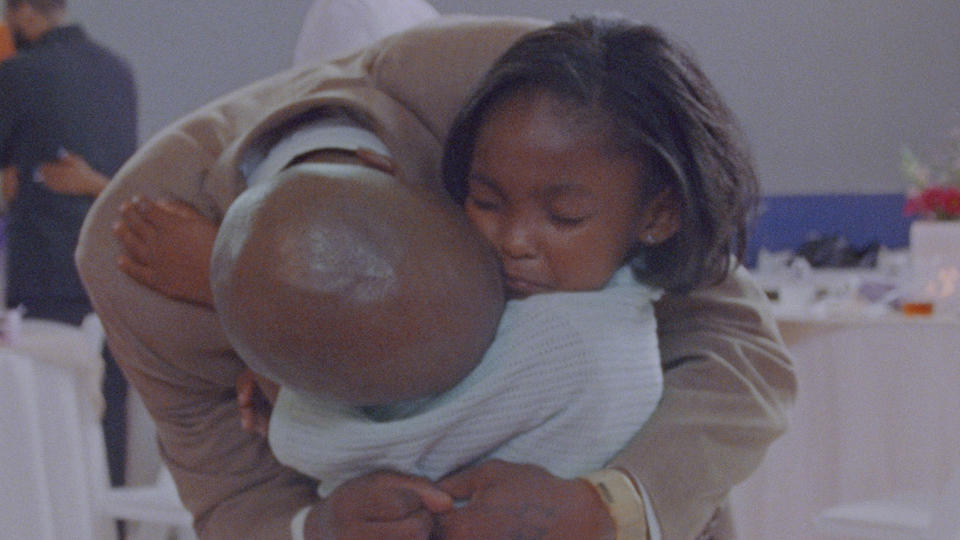
In Natalie Rae and Angela Patton’s entrancing documentary, a group of men gathers in a sunny, brightly hued prison meeting room. Each man wears an orange jumpsuit and has signed on for a 10-week course about fatherhood with life coach Chad Morris. The body language in the room is instructive, not least because it will change over time. Show-me postures will give way to leaning in. Crickets become questions and confessions as the day nears when the men will attend a dance and luncheon in the repurposed prison gymnasium, reunited with the daughters from whom they’ve been separated. As interesting as the goings-on in that prison room will be, the stars of “Daughters” are the titular girls. The film is rife with visually lyrical moments that connect viewers with the young ones’ sorrows, fears, insights and hopes. (Read the full review by Lisa Kennedy.)
A Different Man
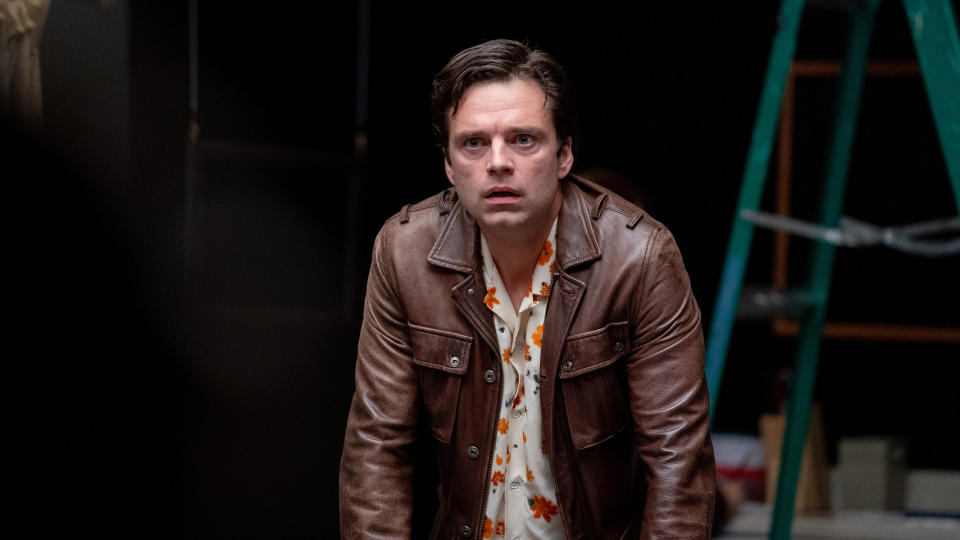
Aaron Schimberg’s thought-provoking fable asks what it means to be “normal,” as an actor with facial deformities (modeled on Adam Pearson) undergoes an experimental procedure that leaves him looking like Sebastian Stan. The kind of oddball satire only A24 would dare to produce, it suggests the bizart-house version of a Woody Allen movie, wherein traditional jokes have been axed in favor of deliciously cringe-inducing scenes between this guy and the playwright next door (Renate Reinsve), who writes him a role he’s no longer right for. Born with a cleft palate himself, Schimberg attempts — and mostly succeeds, with deliciously awkward results — to cram a lifetime of thoughts about beauty and ugliness, attraction and disgust, identity and performance into a sly, Charlie Kaufman-esque project. The postmodern meta-film finds room for both Stan and Pearson to play characters with the same physiognomy, and it takes the bold route of making both men insufferable in different ways. (Read the full review by Peter Debruge.)
Devo
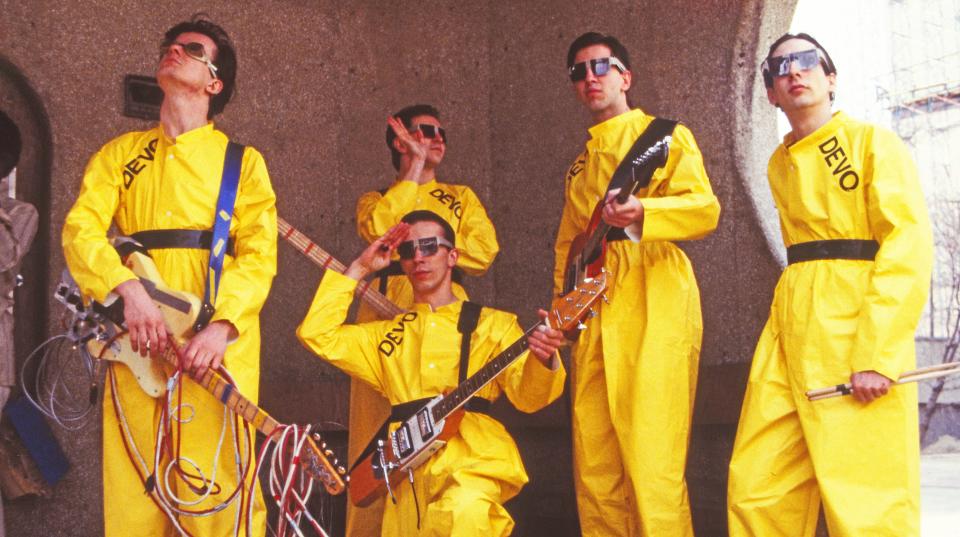
Chris Smith’s documentary about the jump-suited robo-rock avatars of de-evolution is every bit as fun as its subject. It’s 90 minutes of irresistible pop history and dazzlingly edited surrealist audio-visual candy. The film captures how Mark Mothersbaugh and Gerald Casale, the founding leaders of Devo, drew on a crazed welter of inspirations, making themselves into performance-art showmen, pioneers of music video, satirical absurdists with a big message (that American society wasn’t progressing — it was devolving), and sizzling musicians who created their own brand of inside-out rock ‘n’ roll. Through it all, though, the band’s real theme wasn’t “de-evolution.” It was fascism — the way that we were now living in a world of cookie-cutter orthodoxy, of obedience. And Devo, as the film shows us, had the prophetic wit to make themselves an example of it. (Read the full review by Owen Gleiberman.)
Exhibiting Forgiveness
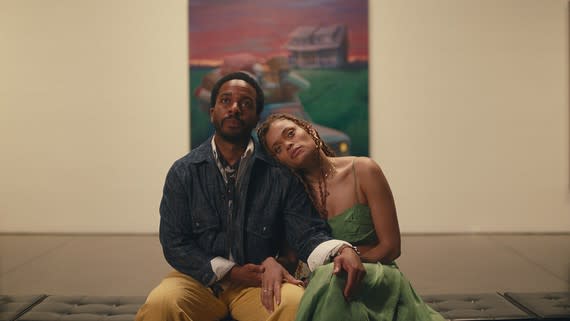
Titus Kaphar’s drama is more raw, less melodramatic and sentimental than the father/son reconciliation sagas we’re used to. Tarrell (André Holland), who paints dreamy neon-rainbow-hued suburban fantasias, seems to have it all: a happy family, a successful niche in the art world. But then his estranged, recovering-crack-addict father (a brilliant John Earl Jelks) shows up. Can Tarrell forgive him for what he did and didn’t do? The movie shows you how everyday trauma can take on the power of personal mythology. (Read the full review by Owen Gleiberman.)
Girls Will Be Girls
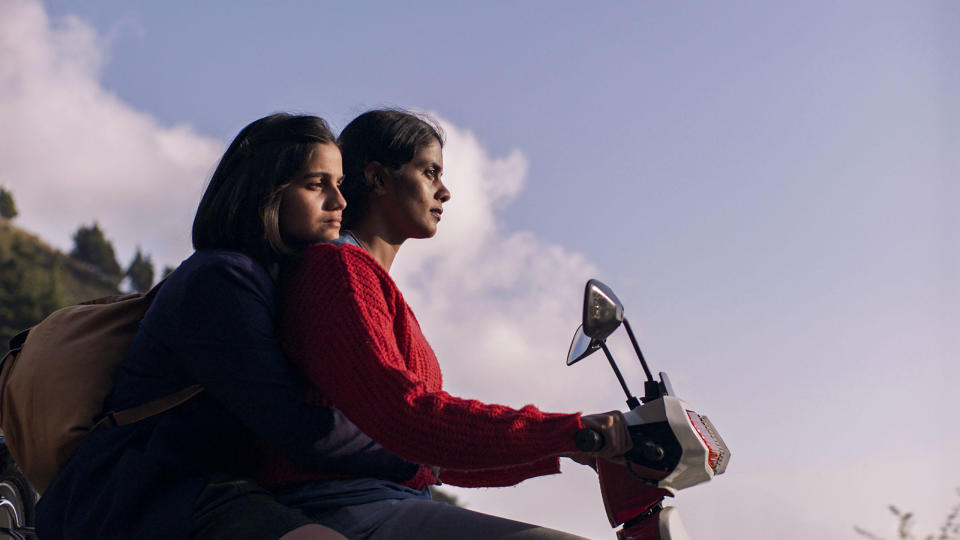
A mother and daughter both come of age in Shuchi Talati’s engrossing feature debut about angst and desire. In this gentle English-Hindi drama set in the Himalayan foothills, the draconian Indian boarding school setting robs its teen protagonist of the language to express (or fully understand) her burgeoning sexuality. Talati, however, fills in those wordless blanks with images both graceful and precise. The closer charismatic newcomer Sri (Kesav Binoy Kiron) gets to Mira (Preeti Panigrahi), the first girl at her institution ever named Head Prefect, the more Mira’s mother (Kani Kusruti) begins to inadvertently see her daughter’s coming of age as a proxy for her own — or rather, the coming of age she was denied by her much stricter parents. (Read the full review by Siddhant Adlakha.)
Kneecap
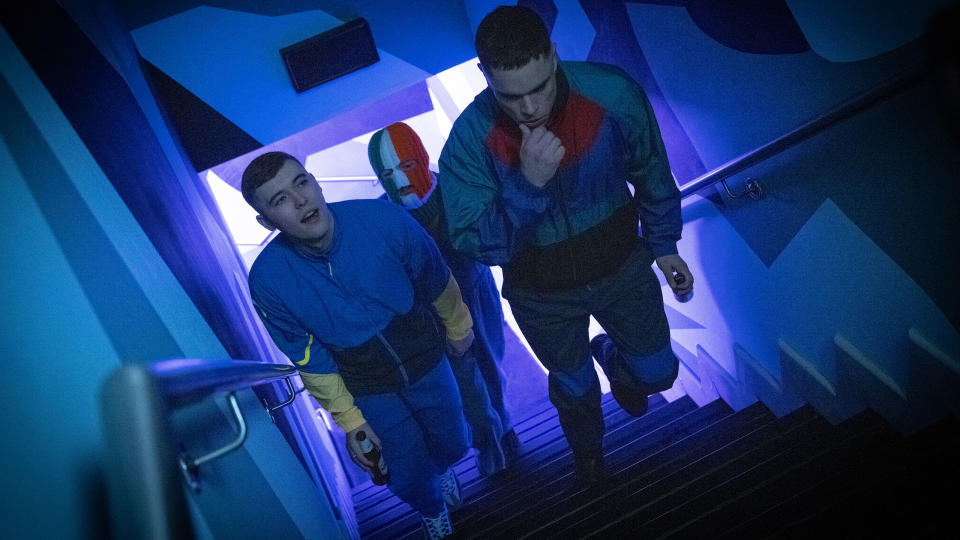
Bursting with unruly energy that practically escapes the confines of the screen, “Kneecap” is a riotous, drug-laced triumph in the name of freedom that bridges political substance and crowd-pleasing entertainment. The three members of the eponymous Irish rap group play themselves in this liberally fictionalized reimagining of their origin story set in Belfast, Northern Ireland. Cornerstone to the trio’s artistic ethos is the use of the Irish language, to which writer-director Rich Peppiatt (a Brit) remains faithful. The island’s ancient native tongue — once banned by the British — is intrinsically tied to the identity of the colonized Irish people, often seen as an emblem of their enduring culture and defiance against British imperialism. If as the adage suggests every word in Irish is in fact a bullet to the heart of the oppressor, then the Kneecap lads are spitting an explosive verbal barrage. (Read the full review by Carlos Aguilar.)
Love Lies Bleeding
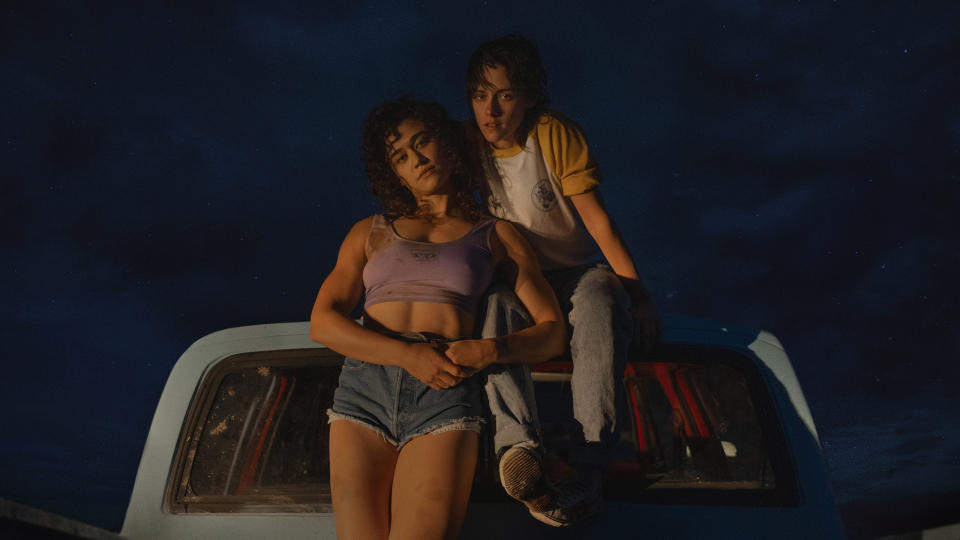
Rose Glass’s queer romantic noir goes to extremes, but there’s nothing mannered about it. It’s set in rural grunge New Mexico in 1989, and you can taste the deadbeat Southwestern sleaze. Kristen Stewart, in lank messy hair that hangs down in chopped bangs and a mullet by default, plays Lou, who falls for Jackie (Katy O’Brian), a bodybuilder who drifted in from Oklahoma. The two take a domestic matter into their own hands, resulting in a crime they’ll spend the rest of the film trying to hide from the police. Except that Jackie’s new addiction to steroids raises the stakes in a crazy way. Ed Harris, in a fringe of long hair that makes him look like a creepy skull, is Lou’s evil gangster father. “Love Lies Bleeding” has the gonzo twists and ultra-violence of a midnight movie, yet it’s made with a powerful sense of style. It creates a vision and sticks to it. (Read the full review by Owen Gleiberman.)
My Old Ass
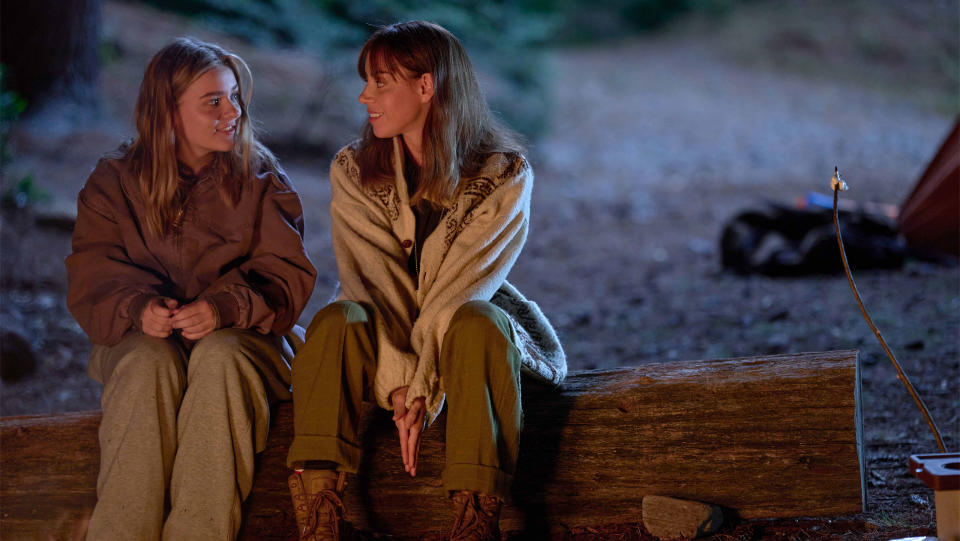
Initially off-putting, 18-year-old Elliott (Maisy Stella) is young and self-involved, so focused on heading off to college in the big city that she’s kind of a jerk to everyone around her (especially her small-town cranberry-farming family). But that’s kind of the point of “The Fallout” director Megan Park’s older-and-wiser second feature, in which Elliott is visited by her 39-year-old self (Aubrey Plaza). Queer and questioning, teenage Elliott’s eager for pointers. “Can you avoid anyone named Chad?” Plaza’s character says cryptically. Fittingly enough, “My Old Ass” could be seen as Park circling back to make a YA film for an imaginary version of herself, including an especially funny Justin Bieber cover. Park uses “My Old Ass” as a delivery device for insights that have come to her through life experience. It’s a testament to her writing talent that the script is funny first, poignant second and only the slightest bit patronizing. (Read the full review by Peter Debruge.)
A Real Pain

It proves that Jesse Eisenberg is a major filmmaker. He wrote and directed this funny, heady, beautifully staged ramble of a road movie about two Jewish cousins, David and Benji Kaplan (played by Eisenberg and Kieran Culkin), who are taking a group “Holocaust tour” of Poland. “A Real Pain” is full of blustery talk about a great many things, and the suffering embedded in Jewish history — the way the past speaks to the present — is one of them. But only one. Eisenberg, in a baseball cap, plays David as a vintage Jesse character, earnest and uptight, whereas Culkin’s Benji is a loose cannon — a bro who never grew up. He jokes and jabbers and interrupts and says inappropriate bro-y things. Yet people are drawn to the wit of his self-centered energy. Culkin, after “Succession,” does a sensational piece of acting that demonstrates his fast-break insolence can work on the big screen in a huge way. (Read the full review by Owen Gleiberman.)
Skywalkers: A Love Story

Jeff Zimbalist’s documentary redefines the words “high anxiety.” It’s set in the world of rooftoopers, and it’s full of amazing, terrifying, transfixing verité shots of young daredevils scaling the spindly spires that shoot out of the tops of skyscrapers. Yet it’s also a tumultuous love story that follows the saga of two rooftoppers from Russia, Vanya Beerkus and Angela Nikolau. The film is about balancing on the tips of man-made mountains of steel and glass, but it’s also about trust, desire, dread, and transcendence. (Read the full review by Owen Gleiberman.)
Super/Man: The Christopher Reeve Story
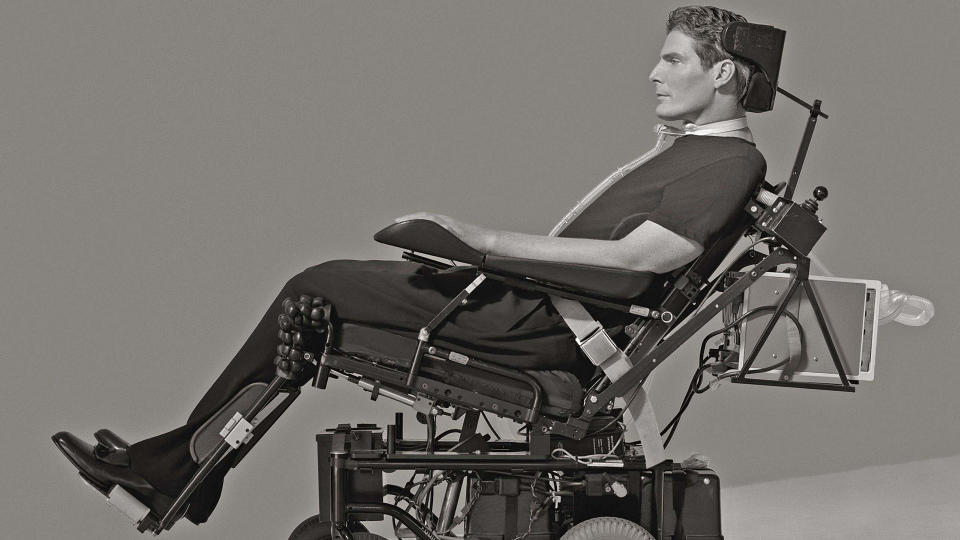
Moving, wrenching, and compellingly well-made. Ian Bonhôte and Peter Ettedgui’s documentary tells the story of how Christopher Reeve, so indelible as Superman that it’s as if he was Superman, suffered a tragic riding accident that left him paralyzed from the shoulders down. The film presents an intimate account of how Reeve met his fate and transcended it, as he made himself into a fearless activist for the disabled. As told here, it’s a parable of faith, like a Book of Job for the age of celebrity. (Read the full review by Owen Gleiberman.)
Veni Vidi Vici
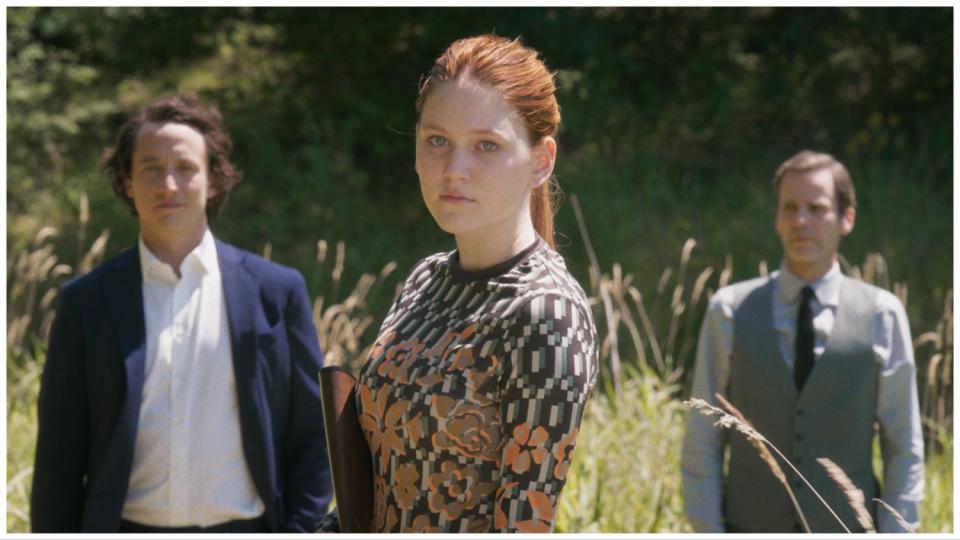
Hailing from the country that gave us such grim social critics as Michael Haneke and Ulrich Seidl, Daniel Hoesl and Julia Niemann’s Vantablack Austrian satire opens with a senseless homicide. It’s a startling scene calibrated as the darkest sort of comedy as serial killer does his hunting out in the open, without shame or any pretense of covering his tracks. The movie makes no mystery of the sniper’s identity, revealing it right from the jump, and yet the authorities show zero interest in arresting the guilty party. That’s because the person responsible (Laurence Rupp) is a millionaire, which makes him untouchable in this deeply cynical capitalist takedown. Practically the only way not to be outraged by the movie is to view it as an allegory, which is precisely how the directors intend a film where members of the 1% are free to hunt civilians for sport. (Read the full review by Peter Debruge.)
Will & Harper
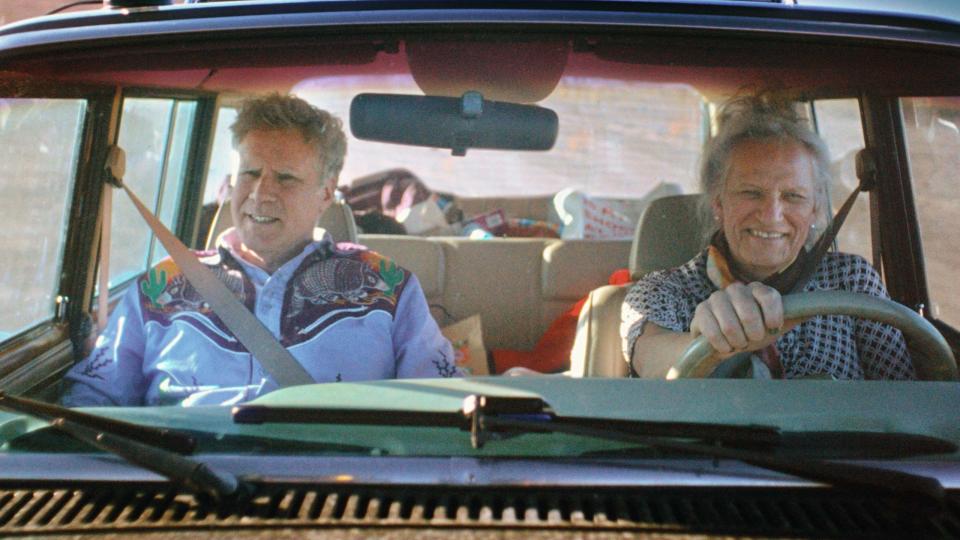
After receiving a long, vulnerable coming-out email from old friend (and former “SNL” head writer) Harper Steele describing her decision to transition at 61, Will Ferrell suggested that they meet up and travel the country together. Fueled by laughs and tears and the occasional “Borat”-style stunt, their cross-country road trip gives Ferrell a chance to ask questions and learn from this incredible woman. It’s the ideal vehicle for a frank, entry-level discussion, seeing as how most audiences don’t have a trans friend with Steele’s “ask me anything” attitude. To some extent, the 16-day excursion was arranged for Ferrell’s benefit — the star sincerely wanted to understand a daunting subject and to support his friend as best as he could — knowing it would ultimately benefit mainstream audiences even more. (Read the full review by Peter Debruge.)


